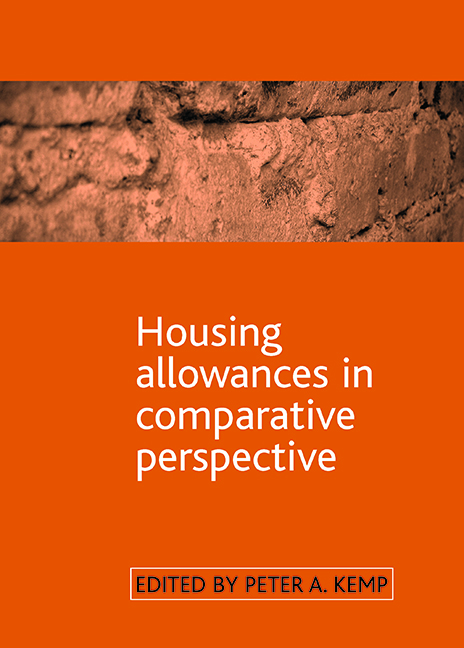Book contents
- Frontmatter
- Contents
- List of tables and figures
- Acknowledgements
- Notes on contributors
- one Housing allowances in context
- two Housing allowances and the restructuring of the Australian welfare state
- three The New Zealand experience of housing allowances
- four Canadian housing allowances
- five Housing allowances American style: the Housing Choice Voucher programme
- six Housing Benefit in Britain: a troubled history and uncertain future
- seven Housing allowances in France
- eight Housing allowances in Germany
- nine Housing allowances in the Netherlands: the struggle for budgetary controllability
- ten Housing allowance systems in Sweden
- eleven Housing allowances in the Czech Republic in comparative perspective
- twelve Housing allowances in the advanced welfare states
- Index
eight - Housing allowances in Germany
Published online by Cambridge University Press: 15 September 2022
- Frontmatter
- Contents
- List of tables and figures
- Acknowledgements
- Notes on contributors
- one Housing allowances in context
- two Housing allowances and the restructuring of the Australian welfare state
- three The New Zealand experience of housing allowances
- four Canadian housing allowances
- five Housing allowances American style: the Housing Choice Voucher programme
- six Housing Benefit in Britain: a troubled history and uncertain future
- seven Housing allowances in France
- eight Housing allowances in Germany
- nine Housing allowances in the Netherlands: the struggle for budgetary controllability
- ten Housing allowance systems in Sweden
- eleven Housing allowances in the Czech Republic in comparative perspective
- twelve Housing allowances in the advanced welfare states
- Index
Summary
Introduction
The social policy dimension of housing is characterised by society's (shifting) idea of the acceptable minimum level of adequate housing in terms of quality and quantity. Housing policy aims to enable everyone to realise these basic housing standards independent of their personal income and other prevailing circumstances (for example the local rent level, number of children). Housing allowances – Wohngeld in German – come into play whenever income is insufficient to enable the household to obtain accommodation that meets a minimum housing standard. As a tied income transfer, it is an incentive towards a higher individual housing consumption.
Wohngeld is not, of course, the only policy instrument for encouraging households to obtain housing that meets a minimum standard. Social housing can have the same effect by setting social rents below market rents and reserving the dwellings for the most needy groups. Even general rent ceilings may have a comparable effect, though they have harmful consequences for other housing policy goals.
While most housing economists and policy makers are opposed to general rent ceilings – if not in every case, then at least in an equilibrium market situation – housing allowances have not attracted as much criticism over the decades. Quite different from the often mismanaged and costly social housing programmes, housing allowances are widely seen in Germany as a relatively market-conforming instrument of social policy (eg Albers, 1982, p 204; Stern, 2001, p 81) with the ability to act as a substitute for an important part of the social housing programmes.
Housing allowances in context
In Germany, both tenants and homeowners are eligible to claim Wohngeld if they fulfil the qualifications. The role of Wohngeld in German housing policy has been very important. In 2004, 3.5 out of 39.1 million households received €5.2 billion of Wohngeld transfers (see Figure 8.1). This expenditure on Wohngeld corresponds to 0.24% of the German GDP and to around 27% of total housing subsidies excluding tax relief. In total, 9.0% of all households received a housing allowance in 2004. However, due to radical change in target group definition, the cost and caseload of Wohngeld fell dramatically in 2005 (see Figure 8.1).
- Type
- Chapter
- Information
- Housing Allowances in Comparative Perspective , pp. 159 - 192Publisher: Bristol University PressPrint publication year: 2007
- 2
- Cited by



